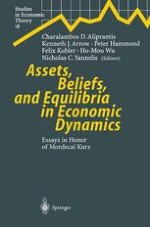2004 | OriginalPaper | Buchkapitel
Is assortative matching efficient?
verfasst von : S. N. Durlauf, A. Seshadri
Erschienen in: Assets, Beliefs, and Equilibria in Economic Dynamics
Verlag: Springer Berlin Heidelberg
Enthalten in: Professional Book Archive
Aktivieren Sie unsere intelligente Suche, um passende Fachinhalte oder Patente zu finden.
Wählen Sie Textabschnitte aus um mit Künstlicher Intelligenz passenden Patente zu finden. powered by
Markieren Sie Textabschnitte, um KI-gestützt weitere passende Inhalte zu finden. powered by
This paper develops some general conditions under which complementarities between individual agents imply that assortative matching is efficient. Our analysis has four main findings. First, when agents are organized into equal-sized groups, just as in Becker (1973), the presence of within-group complementarities is sufficient for stratification to be efficient. Second, if group sizes vary, assortative matching may not be efficient even though complementarities are present, unless particular functional form assumptions are imposed. Third, the connection between assortative matching, complementarities and efficiency reemerges if one considers sequences of replications of the economy in which individual coalitions are uniformly bounded in size. Fourth, the presence of feedbacks from the composition of group memberships has important effects on efficient allocations and breaks any simple link between assortative matching and efficiency. Together, these results suggest that the characterization of the cross-section evolution of an efficiently sorted economy is likely to be highly complex.
